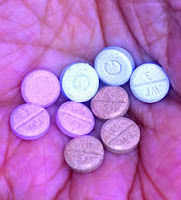New drug may cut risk of stroke by one-third
 People at risk of stroke may, for the first time, be offered a potentially superior alternative to the blood-thinning drug warfarin, following the publication of a major drugs trial yesterday.
People at risk of stroke may, for the first time, be offered a potentially superior alternative to the blood-thinning drug warfarin, following the publication of a major drugs trial yesterday.The RE-LY study compared the effectiveness of warfarin with a new drug, dabigatran, in over 18,000 people at risk of having a stroke due to a common heart rhythm condition called atrial fibrillation.
The Canadian-led researchers found dabigatran reduced the risk of stroke by 34 per cent compared to patients taking warfarin, without increasing the risk of major bleeding.
The results, published online by the New England Journal of Medicine and presented to the European Society of Cardiology Congress in Barcelona yesterday, suggest doctors will be able to offer patients an alternative to warfarin, which is highly effective within a narrow dose range, but requires regular monitoring to check its effectiveness and to prevent the risk of unwanted bleeding.
According to Professor Stuart Connolly, director of the Division of Cardiology at McMaster University in Canada, a lead investigator of the study, “several new drugs have been recently studied to see if they could replace warfarin. None, however, has been satisfactory.”
“Either they were not effective enough, they had too many side- effects or they caused too much bleeding.
“This is the first time in more than 50 years that a new oral blood thinner has been developed which has been found to be both safer and more effective than existing therapy,” said Dr Connolly.
Atrial fibrillation is the most common heart rhythm condition, affecting about 1 per cent of the total population, rising to 10 per cent in people over the age of 80.
People with the condition have an increased risk of blood clots, which in turn raises the risk of developing a stroke. About one in six strokes are caused by atrial fibrillation.
The RE-LY study was carried out in more than 951 centres in 44 countries. Patients were enrolled over a two-year period and followed up for one further year.
The results found a higher dose of dabigatran (marketed under the trade name Pradaxa), at 150 mg twice daily, significantly reduced the risk of stroke by 34 per cent compared to warfarin.
The lower dose, 110 mg twice daily, had a similar effect to warfarin in the prevention of stroke, but with significantly less major bleeding.
Source : www.irishtimes.com
read more» Read more...














